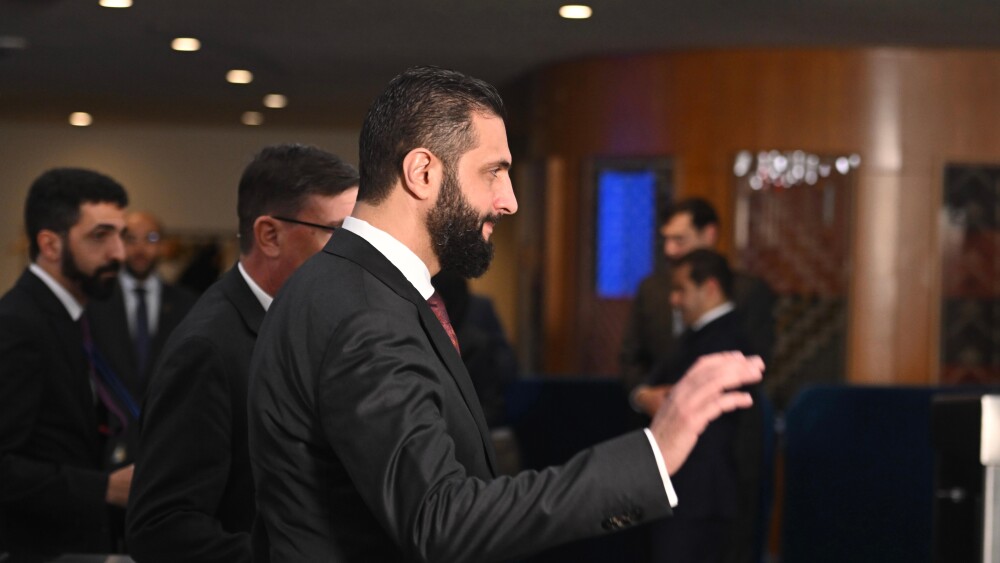History is rarely kind to complacency. The 1980s taught Washington a brutal lesson: short-term partnerships with men of violent conviction can metastasize into long-term threats. That lesson matters again as Ahmed al-Sharaa, a onetime militant commander with ties to jihadist networks, strides onto the world stage claiming the mantle of Syria’s new leadership. His arrival in New York for the U.N. General Assembly is being billed as a historic normalization of Damascus.
Al-Sharaa did not emerge from a university debating club. He rose through jihadist ranks and led forces that for years operated under banners tied to transnational extremist currents.
For those who remember how friendly hands can later turn lethal, it reads like alarm bells.
Al-Sharaa did not emerge from a university debating club. He rose through jihadist ranks and led forces that for years operated under banners tied to transnational extremist currents; that record is part of why he is both potent and controversial as a would-be statesman. His rapid transformation from battlefield emir to interim president has been accompanied by an aggressive diplomatic offensive: he is seeking recognition, reconstruction money, and a reversal of sanctions that still hobble Syria’s economy. The optics of former militants asking for international legitimacy and open bank accounts are not merely awkward; they are a test of whether the international community learns from history or repeats it.
There is, of course, a story the West loves to tell itself: that men can be remade when violence gives way to governance, that the trappings of statehood temper the impulses of insurgency. There are cases where former fighters have become steady administrators. But the more relevant caution comes from the other side of the ledger — from the unintended consequences of 1980s geopolitics.
The anti-Soviet jihad helped create networks and a culture of transnational militancy that later reconstituted itself into global terror movements. Whether or not Washington directly funded every volunteer who fought in Afghanistan, the arc from wartime convenience to peacetime catastrophe is uncomfortably well documented and widely acknowledged in official histories of the era.
The troubling part of the current moment is not only Al-Sharaa’s past but how quickly the international community has been willing to treat his government as a conventional partner.
For Israel, the stakes are not theoretical. A Syrian state that owes its institutions, militias, or patronage lines to men who trafficked in jihadist networks will inevitably pose asymmetric threats to Israeli security. Border sanctuaries for radicals, clandestine arms corridors, and the normalization of extremist ideologies — these are not abstractions; they are the mechanisms by which regional threats are exported.
When a leader with Al-Sharaa’s biography seeks the trappings of legitimacy, Israel must weigh the diplomatic niceties against the concrete risk that legitimization can entrench and finance the very networks that threaten its citizens.
The troubling part of the current moment is not only Al-Sharaa’s past but how quickly the international community has been willing to treat his government as a conventional partner. Some capitals are already contemplating de-escalation and reconstruction assistance; others are discussing re-establishing formal ties. That sequence — battlefield victory, instantaneous statecraft, and an international rush to normalization — is precisely what turns local insurgencies into platforms for transnational harm.
Prudence does not require perpetual isolation. It demands conditionality, transparency, and the hard accounting of risk. If international aid is to flow, it should flow into clearly monitored reconstruction channels, not unchecked state coffers that can be repurposed for proxy wars or radical export. Diplomatic meetings should be accompanied by verifiable steps — independent oversight of security forces, demonstrable dismantling of transnational militant cells, and unfettered access for international investigators where allegations of war crimes or terror links have been raised.
Prudence does not require perpetual isolation. It demands conditionality, transparency, and the hard accounting of risk.
The alternative is to hand the instruments of statecraft to men whose loyalties and networks remain opaque, then wonder later why violence again spilled outward from a country that had once been “reclaimed.”
When Americans and Europeans look back on the 1980s, many now admit that tactical convenience blinded them to long-term risks. If the world repeats that pattern with Ahmed al-Sharaa, it will not be because history surprised anyone; it will be because policymakers chose to forget it. The real question now is whether the West will treat history as a warning or as a footnote. For Israel and for all the neighbors who would bear the cost of another strategic miscalculation, that question cannot be deferred.
Published originally on September 24, 2025.







